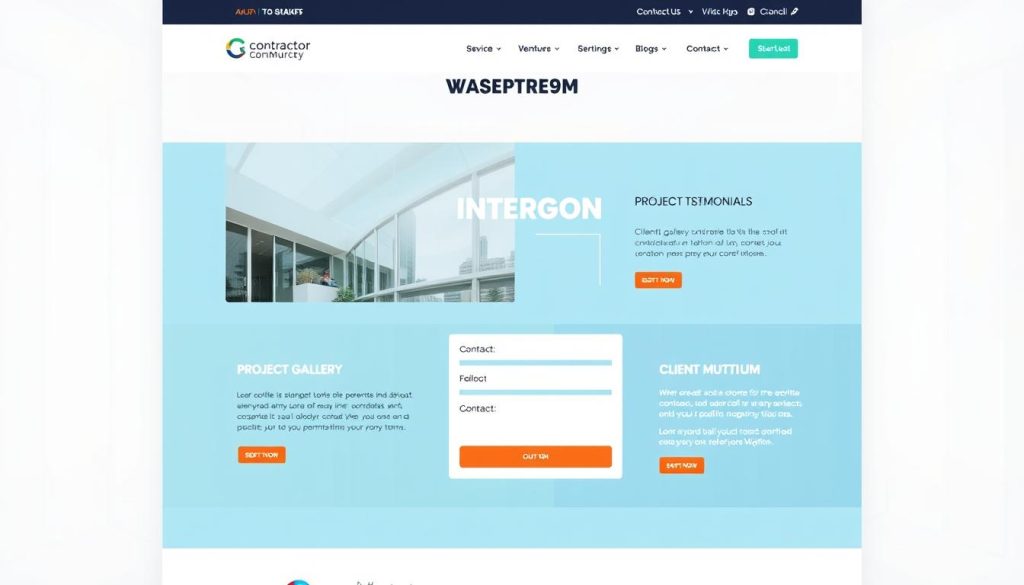Did you know that 70-80% of visitors to contractor websites are browsing on mobile devices? This fact highlights the need for a strong online presence. A presence that engages and converts potential customers. In today’s market, it’s crucial to know what a contractor website should include. It’s about more than listing services. It’s about creating an experience that builds trust and shows off your skills.
In this section, we will look at the top features for contractor websites. These features establish credibility, enhance user interaction, and drive leads. Every detail, from clear branding to a mobile-friendly design, plays a part in turning visitors into clients.
Key Takeaways
- A strong online presence is essential for capturing mobile traffic.
- Clear branding and unique services set contractors apart from competitors.
- Effective navigation and layout enhance user experience.
- Responsive design is crucial for engaging mobile users.
- Strong visuals and case studies improve credibility and showcase past work.
- Well-structured content improves search engine rankings and visibility.
Essential Elements of a Contractor Website
An effective contractor website must have key elements to capture attention and build trust. We focus on essential features that improve the visitor’s experience and show your professionalism. These features make your website standout in a crowded market.
Clear Branding and Logo
A clear brand identity is crucial. A prominent, well-designed logo communicates your values and builds trust. Using consistent colors and typography across your site helps people recognize your brand. In a competitive field, strong branding shapes how clients see you, ranking it high among website essentials.
Easy Navigation and Layout
Visitors should find what they need quickly. This means having a simple menu with labels like Services, Portfolio, and Contact Information. Easy navigation makes for a better visit and keeps users from leaving. A simple, organized site layout is key to keeping potential clients interested.
Responsive Design
With the rise of mobile internet, having a responsive design is a must. Over 85% of adults expect a mobile site to match or exceed the desktop version. A responsive site adapts to different devices, helping with SEO and making visitors happy. Sites that work well on mobile see more actions from users, highlighting its necessity among top website features.
Looking for more tips on building a contractor website and reaching homeowners? Check out these essential resources for more information.
Highlighting Services Offered
Showcasing services well is crucial for contractor websites. Potential clients need clear descriptions to grasp what’s available. Each service benefits from its own section, boosting engagement and SEO. Including relevant keywords helps in attracting visitors and improving search rankings.
Detailed Service Descriptions
An organized list of services draws in potential customers. It’s important to cover:
- Specific offerings – Explain what’s included to set clear expectations.
- Unique selling points – Highlight what makes your services stand out.
- Target audience – Identify who will benefit most from each service.
Adding these elements makes your offerings clear and builds trust. A contractor’s website must capture attention and navigate users smoothly. Being descriptive boosts both appeal to customers and search rankings.
Visual Portfolio of Past Work
Visuals greatly enhance a website’s appeal. A portfolio with high-quality images shows off skill and professionalism. Using professional photos lets potential clients see the quality themselves.
Consider adding:
- Before-and-after shots – These highlight your services’ impact.
- Project galleries – Make it easy to view different kinds of work.
- Client testimonials – Pair positive feedback with visuals to build trust.
These elements not only attract but also convince potential clients of your expertise. An impressive portfolio aids SEO and meets core website needs to attract and keep clients.
Contact Information and Accessibility
Every contractor website needs easy-to-find contact info. It’s key to making potential clients feel at ease. By offering different ways to get in touch, you show you’re open to hearing from them. This builds strong client relationships.
Multiple Ways to Reach You
Clients like having choices on how to contact you. Important options to include are:
- Phone Number: Easily seen for quick calls.
- Email Address: A direct email allows for detailed questions.
- Contact Form: Makes it simple for clients to send a message.
- Social Media Links: Encourages conversations and connections.
These elements are key for a good contractor website. They make the site more user-friendly.
Business Hours and Location
It’s important to tell clients when you’re available. Share your working hours and location. Here’s a table that shows how to arrange this info:
| Contact Method | Details |
|---|---|
| Phone | (123) 456-7890 |
| info@contractor.com | |
| Contact Form | Submit Your Inquiry |
| Social Media | Connect With Us |
| Location | 123 Contractor St, Construction City, CA 90210 |
Adding these details to your website is crucial. It makes communication easy. And it helps build trust with your future clients.
Client Testimonials and Reviews
In the world of contracting, trust is key. Testimonials and reviews prove the quality of your service. They make potential clients feel connected to you immediately.
Importance of Social Proof
Social proof is a powerful influence. It convinces people to pick you over others. Almost 97 percent of folks check the internet for local businesses first.
Featuring client testimonials boosts your credibility online. It helps in decision-making. When visitors see glowing reviews, they’re more likely to stick around.
Showcase Real Client Experiences
Real client stories can be shown in different ways, like case studies. They tell about the hurdles you’ve cleared and what you’ve accomplished. Adding photos from past projects with these stories helps clients imagine your work.
Dedicating a section for testimonials or featuring them on the homepage builds trust. It also improves interaction with your website.

| Client Name | Project Description | Testimonial |
|---|---|---|
| Jane Smith | Kitchen Remodel | “The team transformed our outdated kitchen into a modern space. Highly recommend!” |
| Michael Johnson | Bathroom Renovation | “Truly a wonderful experience! The workmanship was exceptional.” |
| Linda Garcia | Deck Installation | “Reliable and professional. Our deck looks amazing!” |
| Tom Brown | Roof Replacement | “Excellent service! They were on time and very thorough.” |
For more tips on improving your contractor website, check out this resource. It can help you attract new clients.
Blog and Resources Section
Adding a blog and resources area is key to any contractor’s website. It gives homeowners important insights and advice. This knowledge helps them make informed decisions and shows our skill in construction. Keeping this section updated also boosts our website in search results. This happens because we use relevant keywords and topics that people look for.
Industry Insights and Updates
Our blog shares the newest trends in building materials, eco-friendly practices, and new tech. Topics like these not only show we’re knowledgeable but also help our website rank better online. Homeowners like learning about building codes, how to finance their projects, and choosing the best contractor. Our posts offer this valuable information.
Helpful Tips for Homeowners
Our blog gives practical advice on website design for contractors. We cover maintaining homes, doing DIY projects, and prepping for renovations. This kind of content makes visitors come back for more. They get to know our services better. This improves their experience on our site and might lead them to contact us.
| Blog Topic | Focus Area | Benefits |
|---|---|---|
| Latest Construction Trends | Sustainable Building | Attract environmentally-conscious clients |
| DIY Home Projects | Home Maintenance | Empower homeowners with knowledge |
| Choosing the Right Contractor | Client Education | Build trust and credibility |
| Financing Options | Home Improvement Funding | Increase conversion rates |
SEO Optimization for Contractor Websites
Today, making a contractor website easy to find is very important. This starts by carefully choosing the right keywords for the site. These keywords should match the services offered. This way, more people can find us when looking for what we offer.
Good keyword use makes our website easier to find. It helps us reach people who really need our services. This can bring in more clients without the high costs of ads.
Importance of Keywords
Keywords are a key part of our SEO strategy. They help us reach those who are looking for our services. This can increase our chances of getting new clients. Plus, it’s more cost-effective than other marketing ways.
Using long-tail keywords is smart too. They match specific searches. This makes our site show up higher in search results.
Local SEO Strategies
For contractors, local SEO is very helpful. Often, clients search for services “near me.” Being listed in local directories helps a lot. It makes our business more visible online.
It’s also good to work with local suppliers for backlinks. Backlinks improve our site’s trust and authority online. This is vital for SEO success.
Content Marketing Tactics
Content marketing also drives traffic to our site. Posting interesting blog posts shows we know our stuff. It draws in people wanting to learn more about our services.
By using tools like Google Analytics, we can watch how well our site is doing. This lets us tweak our SEO strategies for better results.
FAQ
What essential features should a contractor website include?
A contractor’s website needs clear branding and easy navigation. It should also have a responsive design. Plus, detailed descriptions of services, a portfolio with images, easily found contact info, and customer testimonials are key.
How can I improve the user experience on my contractor website?
To better the user experience, make sure your site is easy to navigate. Use clear menu labels. Ensure it’s responsive for phones and tablets. The layout should help visitors quickly find what they need, like services and how to contact you.
Why is it important to have a visual portfolio on a contractor website?
Having a visual portfolio lets potential clients see your work. It builds credibility and shows off your service quality. Use high-quality images, before-and-after photos, and organized galleries to display your projects.
How can I make my contractor’s contact information accessible?
Make contact information easy to find by displaying it prominently. Include phone numbers, email, and a physical address. A contact form on your site makes reaching out simpler for potential clients.
What role do testimonials and reviews play on a contractor’s website?
Testimonials and reviews act as social proof, increasing trust. By showing off positive feedback, you highlight your reliability and skill. A section for client experiences can boost your credibility.
What topics should I cover in a contractor’s blog?
Your blog should cover industry news, construction trends, and DIY home tips. Include updates about your services. This showcases your expertise and can draw in visitors, helping with SEO.
How can I optimize my contractor website for search engines?
To optimize for search engines, use relevant keywords in content, tags, and descriptions. Apply local SEO tactics, and list your business in directories. Regularly update your blog to improve search rankings.
Source Links
- https://mattgerberdesigns.com/what-makes-a-good-contractor-website/
- https://blog.constructionmarketingassociation.org/contractor-website-best-practices/
- https://www.ydop.com/articles/remodeling-contractor-website/
- https://marketingdepot.ca/10-essential-elements-of-a-contractor-website-a-comprehensive-guide/
- https://www.brandconstructors.com/essential-tips-for-effective-general-contractor-website-design/
- https://www.periscopemedia.co/blog/what-makes-a-good-contractor-website
- https://farmboyinc.com/the-ultimate-guide-to-contractor-website-must-haves/
- https://buildbook.co/blog/7-must-haves-for-your-construction-website
- https://www.section508.gov/buy/request-accessibility-information/
- https://www.ada.gov/resources/2024-03-08-web-rule/
- https://www.gosite.com/blog/how-to-optimize-your-general-contractor-website
- https://networkingbizz.com/blog/designing-a-contractor-website-best-practices-and-tips/
- https://ironcloudcreative.com/blog/contractor-website-design/
- https://www.hfsfinancial.net/blog/everything-a-general-contractor-should-have-on-their-website/
- https://www.brandconstructors.com/how-to-build-a-contractor-website/
- https://www.onthemap.com/contractor-seo-agency/
- https://www.webfx.com/industries/home-repair/contractor/seo/


